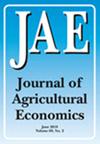总统演讲:对农场业绩的痴迷:灰姑娘的数据故事?
IF 4.2
2区 经济学
Q1 AGRICULTURAL ECONOMICS & POLICY
引用次数: 0
摘要
长期以来,农业政策一直试图解决农业收入低的问题。为分析这些政策而对农场级数据收集的投资产生了广泛的数据集,极大地促进了对农场级绩效的估计和理解。这些高质量的数据集以第一原则方法发展为基础,并由研究或调查人员(里约热内卢)实施。Scopus研究产出搜索(2000-2024)显示了收入、可持续性、绩效、效率和生产力作为研究主题的重要性,这些研究主题利用农场级数据集。如果要实现净零目标,我们现在需要扩大农场层面的数据收集和分析范围。目前的全球可持续性立法仅基于生产或地域排放,这可能会鼓励低碳生产。为了解决这一问题,一种方法是在国际贸易规则中实施农业碳边界调整机制(Ag - CBAM)。这将需要强有力的农场层面温室气体(GHG)数据报告,而事实证明,这些数据报告是复杂的,迄今为止缺乏国家和国际上的定义协议。收集农场层面的关键实践指标(KPRI)数据,包括在欧盟农场可持续性数据网络(FSDN)中,可以展示经济-环境的双赢和农民之间的沟通机会,以减少农业温室气体的影响。这些新数据的核心是与农民接触以使数据提供成为可能的rio。农场层面的绩效分析仍然是我们理解农业和粮食系统的核心。我们应该对收集、整理和综合农场数据的同事给予更多的认可。本文章由计算机程序翻译,如有差异,请以英文原文为准。
Presidential Address: Obsessions With Farm Performance: A Cinderella Data Story?
Agricultural policies have long sought to address the low farm income problem. Investment in farm‐level data collection to analyse these policies has generated extensive datasets that have substantially facilitated the estimation and understanding of farm‐level performance. These high‐quality datasets are underpinned by first‐principles methodological developments and implemented by Research or Investigation Officers (RIO). A Scopus research output search (2000–2024) shows the importance of income, sustainability, performance, efficiency and productivity as research topics drawing on farm‐level datasets. We now require farm‐level data collection and analysis to extend in scope if we are to achieve Net Zero targets. Current global sustainability legislation is based upon production or territorial emissions only, which may incentivise carbon‐inefficient production. To overcome this issue, one approach is the implementation of Agricultural Carbon Border Adjustment Mechanisms (Ag‐CBAM) within international trading rules. These would require robust farm‐level Greenhouse Gas (GHG) data reporting that has proved complex and thus far lack national and international definitional agreement. Collecting farm‐level Key Practice Indicator (KPRI) data, as included in the EU's Farm Sustainability Data Network (FSDN), can demonstrate economic‐environmental win‐wins and farmer‐to‐farmer communication opportunities to reduce agricultural GHG impacts. Central to these new data are the RIOs who engage with farmers to make data provision possible. Farm‐level performance analysis will remain central to our understanding of farming and food systems. We should give greater recognition to our colleagues who collect, collate and synthesise farm‐level data.
求助全文
通过发布文献求助,成功后即可免费获取论文全文。
去求助
来源期刊

Journal of Agricultural Economics
管理科学-农业经济与政策
CiteScore
7.90
自引率
2.90%
发文量
48
审稿时长
>24 weeks
期刊介绍:
Published on behalf of the Agricultural Economics Society, the Journal of Agricultural Economics is a leading international professional journal, providing a forum for research into agricultural economics and related disciplines such as statistics, marketing, business management, politics, history and sociology, and their application to issues in the agricultural, food, and related industries; rural communities, and the environment.
Each issue of the JAE contains articles, notes and book reviews as well as information relating to the Agricultural Economics Society. Published 3 times a year, it is received by members and institutional subscribers in 69 countries. With contributions from leading international scholars, the JAE is a leading citation for agricultural economics and policy. Published articles either deal with new developments in research and methods of analysis, or apply existing methods and techniques to new problems and situations which are of general interest to the Journal’s international readership.
 求助内容:
求助内容: 应助结果提醒方式:
应助结果提醒方式:


